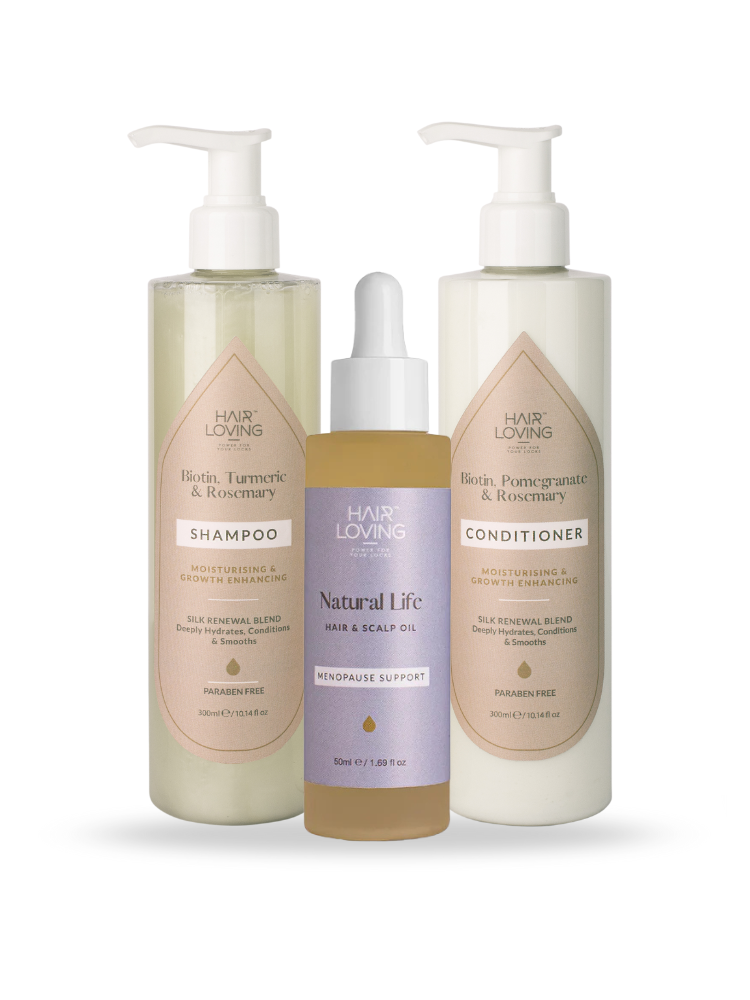When we think of eating disorders, we often picture young women in their teens or early twenties. But recent research published in Post Reproductive Health by the British Menopause Society highlights an often-overlooked reality: eating disorders can peak again in midlife, correlating with menopause.
Just like puberty, menopause brings rapid hormonal changes, shifting body composition, and relentless societal pressure to "slow down" aging. Many women experience anxiety about weight, shape, and appearance, which can lead to restrictive eating habits—sometimes without realizing the impact it has on their bodies.
One of the most visible signs of this hidden struggle? Hair thinning, excessive shedding, and brittle, lifeless strands.
How Eating Disorders Affect Hair & Skin Health
Hair is a reflection of your internal health. When the body is deprived of essential nutrients, it prioritizes vital functions—like keeping your heart and brain functioning—over hair growth. This can lead to weak, thinning hair and increased shedding.
1. Nutrient Deficiencies & Hair Loss
Restrictive eating often leads to deficiencies in protein, iron, zinc, and biotin—all essential for hair growth. Without these nutrients, hair follicles become weaker, leading to:
- Increased shedding (telogen effluvium)
- Thinning hair due to a lack of keratin (the protein that makes up your hair)
- Brittle, dry strands caused by a lack of essential fatty acids
💡 Hair-Loving Tip: Prioritize protein-rich foods like eggs, nuts, and fish to support stronger, healthier hair.
2. Hormonal Imbalance & Scalp Health
Extreme dieting and low-calorie intake can disrupt estrogen levels, which are already declining during menopause. Estrogen plays a key role in maintaining hair thickness and scalp hydration. When levels drop too low, it can cause:
- Slower hair growth
- Increased hair shedding
- A dry, flaky scalp due to reduced oil production
💡 Hair-Loving Tip: Keep your scalp hydrated with nourishing scalp oils and deep-conditioning treatments to counteract dryness.
3. Skin Becomes Dull & More Prone to Aging
When the body lacks essential nutrients, the skin also suffers. Eating disorders can cause:
- Loss of elasticity and premature fine lines
- Dull, flaky skin from a lack of essential fatty acids
- Slow wound healing, leading to more visible damage over time
💡 Hair-Loving Tip: Incorporate healthy fats like avocados, flaxseeds, and olive oil to support skin and scalp hydration.
4. Stress, Cortisol & Hair Loss
Disordered eating increases cortisol (the stress hormone), which can wreak havoc on the hair cycle. Chronic stress causes:
- More hairs to enter the shedding phase (telogen effluvium)
- Thinning at the temples and crown
- Hair to look lifeless and dull due to poor scalp circulation
💡 Hair-Loving Tip: Reduce stress with gentle scalp massages, deep breathing exercises, and mindful movement to support regrowth.
You’re Not Alone—And There’s Help
If you’re struggling with body image and hair changes during menopause, know this: you’re not alone, and your worth is not defined by your hair, weight, or age.
At Hair Loving, we care deeply about holistic well-being—not just hair health, but emotional and physical wellness too. If you need extra guidance, we can connect you with trusted professionals in nutrition and menopause care.
💌 Simply reach out to us, and we’ll share the details.
✨ Take care of yourself first—your hair will follow. ✨
– The Hair Loving Team





